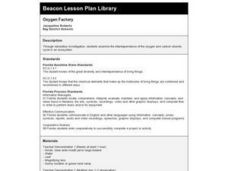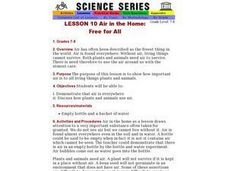Curated OER
Beaver Ecology
Students explore the lives of bgeahvers. They identify the physical and behavioral adaptations that help beavers survive in their environment. Students compare and contrast how beavers influence the ecology of both forest and aquatic...
Curated OER
Ecosystems
In this ecosystems learning exercise, students complete a crossword puzzle with 35 questions about the different types of ecosystems and organisms in them.
Curated OER
Starch is Everywhere
In this science worksheet, students add a few drops of iodine solution to each of 10 substances to determine if they contain starch. The iodine will turn blue if the item contains starch.
Curated OER
Label Your Body
Students assimilate the names of the parts of the body. They practice spelling body part words using a worksheet. They trace the outline of their bodies, add features and label the body parts from the vocabulary list.
Curated OER
Coevolution: A Simulation
Students participate in a demonstration in which they must attempt to suck liquid from varying containers with straws of varying sizes. They discuss the concept of coevolution and see why this activity illustrate the coevolution of...
Curated OER
Roundworms
In this roundworms worksheet, students will review the characteristics of roundworms including the common parasitic roundworms that infect humans. This worksheet has 6 short answer and 2 fill in the blank questions.
Curated OER
Living in a Watershed
Fourth graders examine watersheds. In this ecosystem lesson, 4th graders discover what a watershed is and identify the local watershed they live in. Students investigate the attributes of a watershed as well.
Curated OER
Water Words Puzzle
In this water learning exercise, students fill in the blanks to a crossword puzzle having to do with water words. Students complete 25 blanks in the crossword.
Curated OER
Geography
In this geography worksheet, students write the vocabulary word for the geography definition given. Students complete 22 problems with words from a word bank.
Curated OER
Marvelous Mammals Crossword
In this mammals worksheet, students use clues given to complete a crossword puzzle of words associated with mammals. An answer key is included.
Curated OER
The Sensitive Scavenger
Students create multi-sensory scavenger hunt worksheet to be used on a scavenger hunt throughout the schoolyard habitat area to introduce students to concepts of biodiversity and interdependence within a habitat.
Curated OER
Oxygen Factory
Fourth graders examine the interdependence of the oxygen and carbon dioxide cycle in an ecosystem through a laboratory investigation. After a lecture/demo, 4th graders complete the lab in groups.
Curated OER
Three Clouds Activity
Students explore how clouds are produced through three different age-appropriate hands-on experiments.
Curated OER
Shinto, Stones, and the Garden
Students examine how Shinto and Buddhism are reflected in the Japanese art and life-style, especially as seen in the relationship people have with the land (gardens). This lesson is for the elementary classroom.
Alabama Learning Exchange
Is That a Whale?
Pupils research the characteristics and examples of the two main types of whales. They work in groups to study the habitats of each type of whale before developing a slideshow presentation of the information.
Curated OER
Outdoor Survival
Learners are introduced to basic outdoor survival concepts. They identify the seven basic needs for survival. Students describe the symptoms and treatment for frostbite and hypothermia. They compare and contrast the value of different...
Curated OER
Importance of Digestion
In this digestion worksheet, learners complete statements using researched information about digestion and the digestive system. Students also sketch several figures that relate to digestion.
Curated OER
Invertebrates
In this invertebrates instructional activity, learners read about the characteristics of the different groups of invertebrates. Then students complete 10 multiple choice questions.
Curated OER
Science - What do living things need?
In this living things worksheet, students answer questions that ask what living things need. Students answer 10 questions in the true and false and short answer format.
Curated OER
Water and Ice
Students explore water as it changes states of matter. In this physical property lesson, students use observation, measurement, and communication skills to describe changes in water as it goes from a solid to a liquid and back again.
Curated OER
Desert Tortoise Adaptations
Students observe the Desert Tortoise in its natural surroundings. In this adaptations instructional activity, students study and take pictures of an animal in its habitat, then design a PowerPoint which addresses adaptations,...
Curated OER
Amylase
Young scholars examine what amylase is and its history. In this digestive lesson students study the effect amylase has on starch and how temperature affects the rate of activity.
Curated OER
Air in the Home: Free for All
Students explain that air is everywhere and discuss how living things use air.
Curated OER
What Animals Eat
First graders organize animals according to what they eat. They compare the teeth of plant eaters and meat eaters.

























